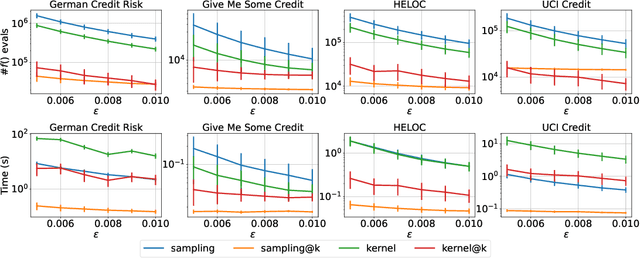SHAP@k:Efficient and Probably Approximately Correct (PAC) Identification of Top-k Features
Paper and Code
Jul 10, 2023



The SHAP framework provides a principled method to explain the predictions of a model by computing feature importance. Motivated by applications in finance, we introduce the Top-k Identification Problem (TkIP), where the objective is to identify the k features with the highest SHAP values. While any method to compute SHAP values with uncertainty estimates (such as KernelSHAP and SamplingSHAP) can be trivially adapted to solve TkIP, doing so is highly sample inefficient. The goal of our work is to improve the sample efficiency of existing methods in the context of solving TkIP. Our key insight is that TkIP can be framed as an Explore-m problem--a well-studied problem related to multi-armed bandits (MAB). This connection enables us to improve sample efficiency by leveraging two techniques from the MAB literature: (1) a better stopping-condition (to stop sampling) that identifies when PAC (Probably Approximately Correct) guarantees have been met and (2) a greedy sampling scheme that judiciously allocates samples between different features. By adopting these methods we develop KernelSHAP@k and SamplingSHAP@k to efficiently solve TkIP, offering an average improvement of $5\times$ in sample-efficiency and runtime across most common credit related datasets.
 Add to Chrome
Add to Chrome Add to Firefox
Add to Firefox Add to Edge
Add to Edge